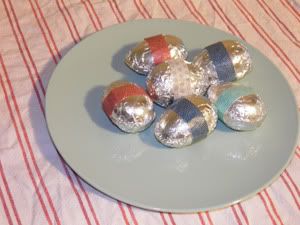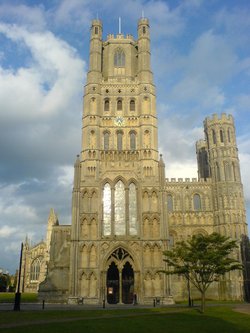 Guest Post by Alison Moffitt(My wife Alison handed in her last ever university assignment today. On her live journal she has been posting about the end of her time at uni. This is the seventh of these posts, which is about Vras, my former lecturer and employer.)
Guest Post by Alison Moffitt(My wife Alison handed in her last ever university assignment today. On her live journal she has been posting about the end of her time at uni. This is the seventh of these posts, which is about Vras, my former lecturer and employer.)One of the best things about university has been the Assoc. Prof. Vrasidas Karalis. Here is a post about him.
"You are freaking me out!"I'm going to say right out that Vras pretty much got me through my degree. My liberal studies degree required me to pass 5 semesters worth of a language. That sounded pretty straightforward after 5 years of Japanese at high school. I chose to study Modern Greek, because it would keep my grandparents happy and get me in touch with my cultural heritage etc, etc. I would not have passed Greek without Vras.
In first year I enrolled in beginner's Greek. We had two teachers - Martina, a lovely gentle but cool young teacher, and Vras, who appeared to me to be the pinnacle of insanity. Our first week was terrifying for me. Martina and Vras stood at the front of the class room trying to weed out the fluent speakers who were too good for beginners. I don't think they got them all. It felt like most of the class, even though they weren't fluent, could still understand Martina and Vras when they accidently slipped into complicated Greek. I spent that year sitting with my friend Amanda. The four hours with Martina were fine. She would give us worksheets, explain grammar to us, ask us questions that were at our comprehensions level. The last hour of the week was with Vras. He would charge into the classroom like a whirlwind, single out one of the girls:
"My, you're looking very radiant today!"and then sit on a desk and proceed to rant about the evils of university bureaucracy, the politics of the local Greek community or the shortcomings of that year's Eurovision contestants. Vras never seemed to have a lesson plan. He would just tell outrageously hilarious or disturbing stories about his life and occasionally link them into our language study by translating the odd word into Greek and scrawling it across the chalkboard. Then he would ask a ridiculous question that was way beyond my Greek knowledge. Amanda and I would cower in the back row, hoping that he wouldn't call on us for an answer.
"Tell me you love..."After about six or seven weeks of uni, Vras decided to teach us the verb
agapo. which means love. Vras wondered around the room pointing randomly at students crying out "Tell me you love your mother!" "Tell me you love your father!". He got to me and paused. That day was one of the first days I had been brave enough to wear my EU shirt. "Tell me you love God!" I wasn;t really sure whether he was mocking me or giving me a chance to share my faith with people. Vras was proving to be a little bit obscure with matters of faith. He would tell very obscene stories and then turn around and talk about the New Testament Greek course that he ran after our class finished. He would tell stories about the time he went on a cruise and did lots of things that he found very pleasurable, and then tell one of the boys in our class in all earnestness that he should really read the book of Matthew in the bible, because it would be good for his soul.
"Forget about it"At the end of the year I followed him up about the New Testament Greek course and summoned the courage to ask him if he was a Christian. Vras looked at me with surprise.
"Of course!"
"Oh. Why do you tell all of those stories?"
Vras paused and then answered (I think he was trying to be cryptic)
"Sometimes a dog's bark is worse than its bite".
Whatever that meant.
We talked for awhile and it turned out that Vras was potentially some kind of amazing heretic. He had been excommunicated from the Greek Orthodox church a couple of years beforehand and was struggling to renew his Greek passport. He sent me a copy of an article he had written, a very scathing history of the Greek Orthodox church. At the time he had decided instead to go the the Anglican church near where he lived in Glebe, although I'm pretty sure he has moved on from there. He doesn't like Calvinists, and most Anglicans in Sydney fall squarely into that category.
"Do you have a friend called Zoe?"New Testament Greek the next year was an absolute scream. I started realising that Vras had different personas depending on who he was teaching. He still liked stirring people up and freaking people out, but this time, in front of Christians, his weapon of choice was not explicit sex stories but outrageous heresy. Most of what he said went way over my head, but Matt was in that class with me, as well as our friend Ryan and both of them are very keen amateur theologians. They would push back on every point they didn't like, and also some that they just enjoyed arguing over. My friend Dan was also in that class with me. He would try to speak up too, although is preferred method of voicing his opinion was to try and answer every and any question that Vras asked of the class.
Vras' favourite method for teaching vocab was to help us link the Greek word with their English words. So, classes went something like "The word for light is phos! Do you know any English words that come from phos? Yes! Photography". Or like "The word for earth is ygis. Do you know any English words that come from ygis? Yes! Geology, Geography." Or "The word for life is zoe. Do you have a friend called Zoe?". Yes, I did, but I didn't have any friends called Thanatos, which means death.
What a difference a year made. Instead of hiding at the back that year, it was a real joy to answer Vras' questions. I was much less self conscious. Dan kept a score sheet of who volunteered the most answers or comments. If you answered a question really well, Vras would reward you with
"Ryan, you are a star."It was the highest compliment you could receive, until one day, after a very intense round of questioning, Dan was rewarded with
"Dan, you are a constellation!"It was during that year that Matt and I started going out and eventually got engaged. Matt used to tie my shoelaces to the desk during Vras' lectures.
The outrageous stories kept coming. His favourite one to retell was about the time that he was in Iceland and was so very depressed that he wanted to kill himself. But then he went for a walk and found a little Greek Orthodox church in the middle of nowhere, with some monks or priests inside who talk to him and made him feel better. My favourite story he often told was about his days as a student in Germany. He studied under Joseph Ratzinger (you may know him now as Pope Benedict XVI) and he would recount the theological arguments that they had. I thought it was sweet being taught by a man who has fought with the pope.
"This is off the planet."Now even the smartest of men must have his point of weakness. For Vras it was PowerPoint software. He didn't really start using it until I took the New Testament subjects, and once he started there was no return. Every week he had learnt a new function or found a cooler template. Every week there were shouts of frustration as, once again, the PowerPoint slides had mangled his Greek text into a whole lot of boxes and squiggles. I think to this day he still hasn't realised that it is not PowerPoint's fault but the fault of the university computers that don't have his Greek font installed. But I digress. One week he had discovered the transition technique where each letter comes up one by one and
every letter spins a cartwheel before settling on the screen. It took a while to get through the slides that day. We would score extra marks for including the maximum number of pictures during our tutorial presentations.
"Now I know most of you were only born a few years ago, but some of you might remember what happened in 1396."And so it went on and on. Matt got a short gig being his research assistant, and I enrolled and enrolled and enrolled in Vras' classes, eventually passing enough MGRK courses to get my degree! Plus more to spare. Byzantium: Between East and West. Greeks in the Diaspora. Greece and the European Imagination. They all rocked, and we would spend countless hours watching B-Grade Greek films, reruns of
Acropolis Now and video clips from aging Greek film stars.
"How very Freudian!"This year one of my classmates took two hours to get through her presentation. She was analysing the representation of Greece in the musical
Mamma Mia. Each time she showed us a section of dialogue of the movie, Vras would insist that we continued watching to the next song.
"Ooh! I love this one! Gimme Gimme Gimme a man after midnight! Madonna sang this one too you know."So I will really miss being in his classes. Even though I have absolutley no memory of a structured class with Vras, he has been one of the most influential and interesting teachers I've had. I may not know how to speak Greek and I may have forgotten a lit of information about Justinian and Homer, but I have really come to appreciate the things you can learn when you question things that are assumed. Vras was very good at getting us to do that. One of the people in his appreciation group on facebook put it this way:
"He knows full well that the best way to teach someone is to get them laughing."
To sum up, I thought I'd leave you with some of the hilarious quotes that have been collected on
Facebook. Enjoy!
-------------------------------------------15 min into our exam, Vras says "Are you all finished yet?" then pushes clock forward - "Don't ask me any questions I'm conversing with Plato..."
"Those Egyptians were very nasty people! They killed and raped and ate the human flesh and blood! They were cannibals! Have you tasted human flesh?" [to an Egyptian student]
"Have you read 'War and Peace' by Leo Tolstoy...? You haven't?! Oh my goodness people, we don't live in a vacuum!"
"You have to be nice to me because I'm writing my
magnus opus on violence so I need affection people!"
"The purpose of an institution like university is to produce intellectual disability"
"Look at your shoes...you can jump to your death from them" (said to a student with high heels).
Student (vehemently): The Greeks gave the light of civilization to the world! (ta fota tou politismou).
Vras (deadpan): Was it Philips or General Electric type lights?
"Justinian loved building walls around things...no doubt as a psychological reaction to his wife who was having sex with half the Empire"
(while talking about sex, Vras stops and looks at a student)
Vras: How old are you?
Student: 19
Vras: You look 14.
(someone tries to start up the sex topic again)
Vras: please, not in front of the minor.
"Elate paidia. Sit closer. Konta! Konta! I don't bite, I don't eat human flesh anymore!"
"Don't you have a friend called Theodora or Zoe?"
"Do you have a friend called Thanatos?"














